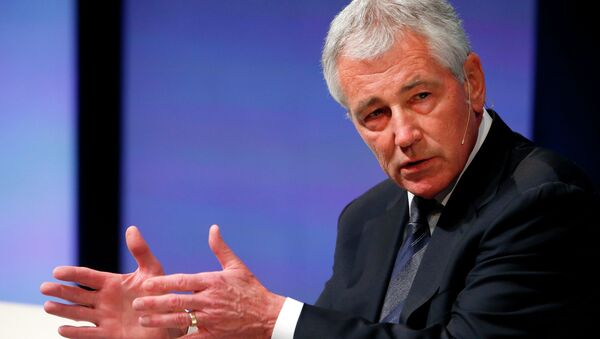WASHINGTON, November 14 (Sputnik) – The US Department of Defense (DOD) will increase its nuclear enterprise budget by 10 percent in each of the next five years to maintain the aging infrastructure, leaders within the department said at a press briefing Friday.
"Over the next 5 years…we're probably looking at a 10 percent increase in [nuclear] enterprise over each of those years. Right now we spend about 15 to 16 billion [US dollars] on [US] nuclear enterprise," US Defense Secretary Chuck Hagel said.
The DOD concluded that the department needed a budget increase following a January review that exposed the lack of oversight towards the US nuclear enterprise.
According to senior military officials, the money would be directed towards renewing aging equipment.
Deputy Secretary of Defense Robert Work said that the funds would help to maintain the country's remaining nuclear arsenal supply that is slowly decreasing.
"We need to keep those weapons safe, secure and effective and I would argue that when your inventory comes down, it's even more important that you are absolutely sure that you're taking care of this," Work said.
Vice Chief of Naval Operations Michelle Howard said that the money would be used to hire more people to maintain the Navy's weapons facility.
"I just visited our strategic weapons facility…last week, those buildings were built 25 years ago and they are in good shape but when you think about [it] it's like your 25 year old house, things start to degrade overtime and then you have to invest money to keep them up," Howard said.
Air Force Lieutenant General Stephen Wilson noted that the infrastructure to support the Intercontinental Ballistic Missiles (ICBM's) was built in the 1960's and needs an overhaul.
"We have missiles that have been on alerts for the last 52 years…that infrastructure and that capability needs to be modernized, built up and sustained and that costs money," Wilson said.
In January, Air Force officers in Montana responsible for part of the nuclear arsenal were found to have cheated on monthly proficiency exams. Last December, the Air Force released a report into the misconduct of Major General Michael Carey, who oversaw the US intercontinental ballistic missile system. That report found Carey drank heavily, fraternised with women, and was guilty of behaviour unbefitting of an officer during a July 2013 trip to Moscow.
Based on recommendations from the internal and external review, Hagel announced a number of reforms and improvements to the US nuclear capability. These include efforts to change the culture and boost morale in the nuclear enterprise, adding new positions and eliminating redundancies, increasing accountability, improving infrastructure and increasing the budget for managing the US nuclear capability.

